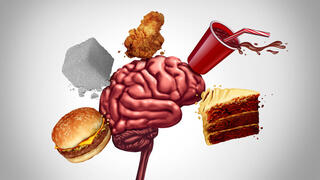
A new international study led by a team of scientists from Ben-Gurion University of the Negev showed controlling blood sugar levels is a significant key mechanism linking diet to slower brain aging. The study, which included 300 participants in one of the longest and largest brain MRI trials in the world, was recently published in The American Journal of Clinical Nutrition journal. Age-related brain degeneration, including gradual neuron loss and brain tissue shrinkage, is a natural part of the aging process.
This process can lead to cognitive decline and other neurological issues. Although aging can't be stopped, the study, led by doctoral student Dafna Pachter and Professor Iris Shai from Ben-Gurion University, alongside international teams of brain experts, explored how an 18-month dietary intervention could impact these processes. "Aging of the brain is a natural, inevitable process.
Our study found that the tipping point, where this process accelerates, is around age 50; until then, the decline is relatively moderate," Shai explained. "Anatomically, this process is mainly reflected in the shrinking of the hippocampus – the part of the brain responsible for memory. So, when people say, 'Where did I leave my keys?' after age 50, it’s likely a sign that their hippocampus has slightly reduced in volume,” she added.
Prof. Iris Shai Photo: Danny Malchis, Ben-Gurion University of the Negev “Conversely, we also see an increase in cerebrospinal fluid volumes in the lateral ventricles of the brain. Over the years, these ventricles simply fill with more and more spinal fluid.
These physiological changes are natural indicators of brain aging." 4 View gallery ( Photo: Shutterstock ) However, according to Shai, these processes can be influenced. Evidence of this is seen in the differences in brain age among individuals of the same chronological age.
"Today, we can quantify brain age compared to chronological age," she explained. "As you might know, not every 70-year-old has the same cognitive function, as brain age varies among people. We know there’s a genetic component, of course, but a large part of it is linked to our lifestyle.
We likely have additional ways to influence brain age and that was the goal of this study – to examine the impact of diet on this influence." As part of the study, an experiment was conducted at the Negev Nuclear Research Center involving 300 participants who were divided into three groups based on dietary composition. Dafna Pachter Brain MRI measurements were taken before and after the trial.
Researchers used the volume of specific brain regions as a metric to estimate brain age and predict future dementia risk. Interestingly, some participants displayed a brain age younger or older than their chronological age. The research team quantified and analyzed MRI brain data using NeuroQuant, an FDA-approved automated computational tool, to investigate the main mechanism linking the Mediterranean diet to slowing brain aging.
4 View gallery ( Photo: Shutterstock ) "By tracking the volumes of dozens of different brain regions with MRI technology, we quantified the participants’ brain volumes before and after dietary intervention," Shai added. The original experiment, published about two years ago, demonstrated a 50% reduction in brain atrophy while consuming a green Mediterranean diet, which included the consumption of Mankai and green tea. Now, the current study's findings highlight blood sugar control as the primary link between diet and the brain regions vital for cognitive function (like the hippocampus, lateral ventricles, thalamus and cerebellum), motor control and sensory processing.
“These findings are crucial not only for people with high blood sugar but for everyone’s health at any age,” Shai explained. “We know that diabetics have a significantly higher risk of dementia , which isn’t a new finding. High blood sugar levels place strain on brain cells and lead to long-term damage, impairing brain function.
” “In this process, advanced glycation end-products (AGEs) form as sugars bind to cellular proteins like collagen and blood vessels, which reduces vascular elasticity and weakens blood supply to the brain.” 4 View gallery ( Photo: Shutterstock ) According to her, compounds found in the Mediterranean diet — especially in foods provided during the study like Mankai, nuts and green tea — help reduce blood sugar levels and enhance cell responsiveness to insulin, ensuring sugar is efficiently distributed throughout the body. "Their antioxidant and anti-inflammatory properties protect brain cells from oxidative damage.
Polyphenols also improve gut bacteria function, which supports the central nervous system, thus protecting the brain from sugar-induced damage and promoting its long-term health,” she added. The study is among the longest and largest dietary and brain MRI studies linking dietary changes directly to improved glycemic control and slowed brain aging. However, further research is needed to thoroughly understand the mechanisms involved.
The findings suggest a potential path for reducing the risk of age-related cognitive decline via simple dietary adjustments. “We’re currently conducting a follow-up study project called FIT (Follow Intervention Trials), in which we track participants from past, well-known studies at the Negev Nuclear Research Center. We’re performing MRI scans and detailed assessments to examine their current brain health and if we could have predicted it retrospectively.
That’s our next phase,” Shai concluded. Get the Ynetnews app on your smartphone: Google Play : https://bit.ly/4eJ37pE Apple App Store : https://bit.
ly/3ZL7iNv >.














